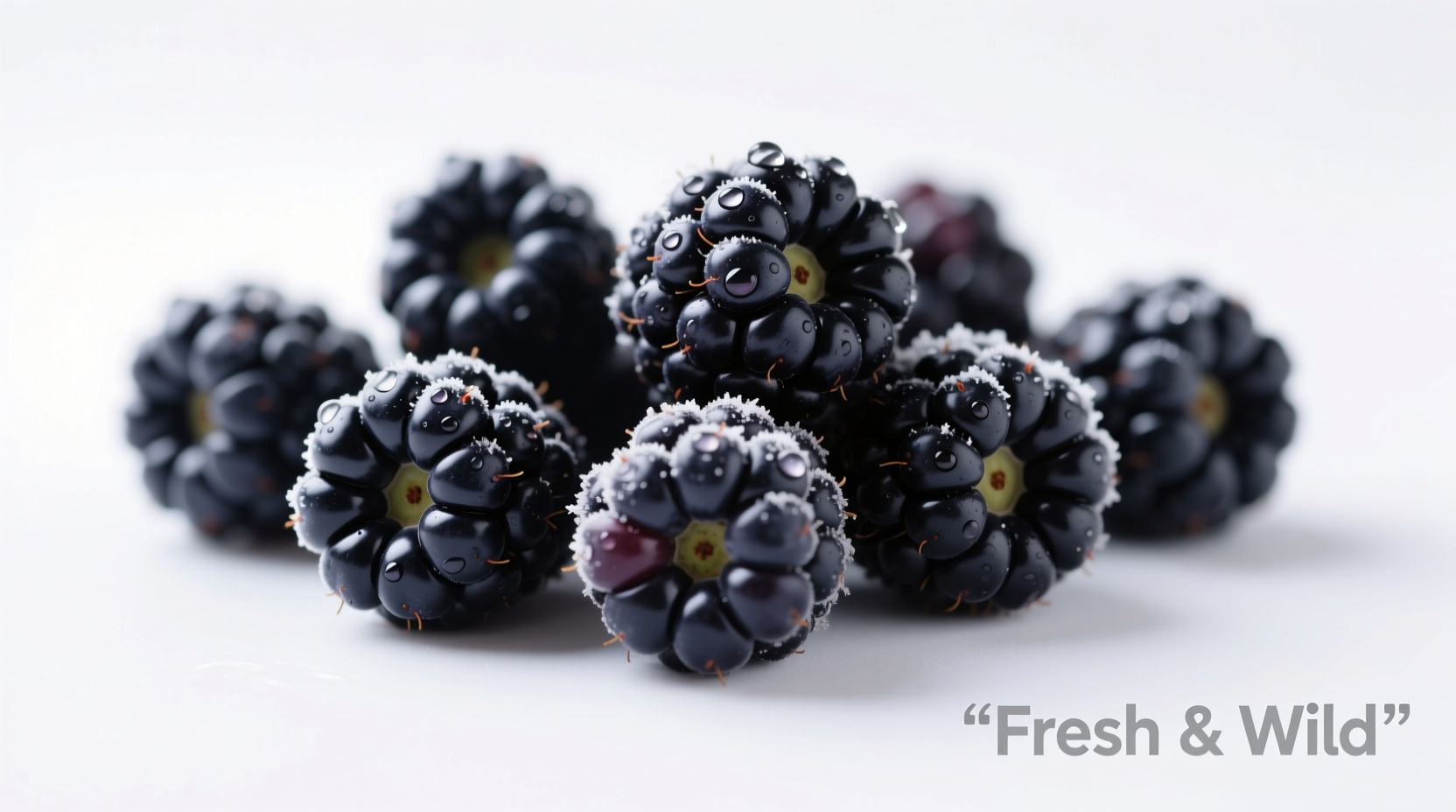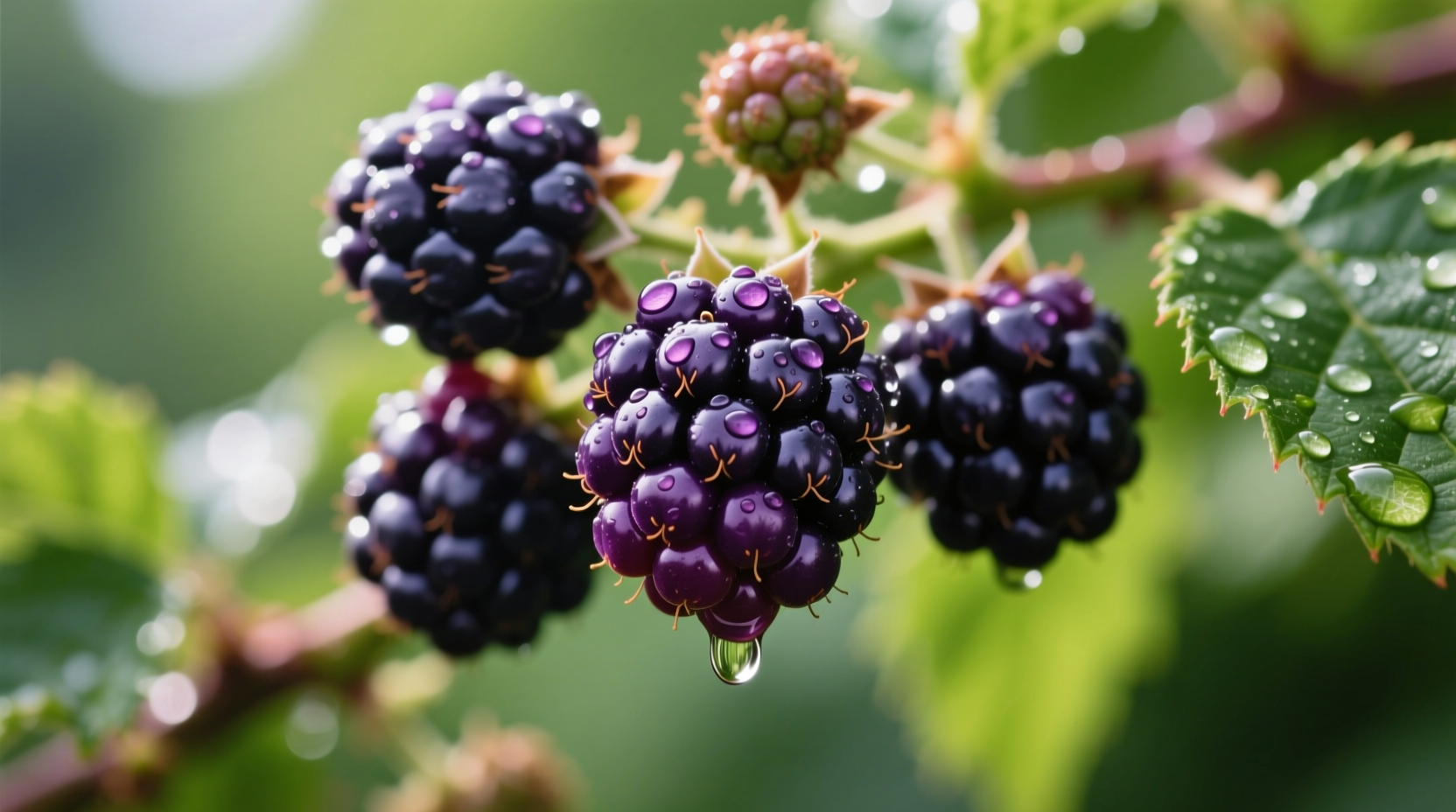The Essential Blackberry Flavor Profile
When you bite into a perfectly ripe blackberry, you experience an immediate burst of juicy sweetness followed by a refreshing tartness that cleanses the palate. The flavor profile contains distinct notes of:
- Berry sweetness – similar to raspberries but less floral
- Wine-like depth – subtle tannins reminiscent of red wine
- Earthy undertones – a characteristic that distinguishes them from other berries
- Citrus brightness – natural acidity that prevents cloying sweetness
Unlike cultivated berries that have been bred for maximum sweetness, wild blackberries maintain a more complex flavor balance that food scientists attribute to their higher anthocyanin content and natural growing conditions. According to research from the Oregon State University Extension Service, this complex flavor profile develops as the fruit transitions from green to red to black during ripening.
How Ripeness Transforms Blackberry Flavor
The taste of blackberries changes dramatically as they ripen. This evolution follows a precise biological timeline that directly impacts flavor development:
| Ripeness Stage | Color | Flavor Characteristics | Sugar-to-Acid Ratio |
|---|---|---|---|
| Unripe | Green | Intensely tart, astringent, bitter | 1:5 (very high acidity) |
| Partially ripe | Red | Tart with emerging sweetness, firm texture | 1:3 (moderate acidity) |
| Fully ripe | Deep purple-black | Balanced sweet-tart, complex notes, juicy | 4:1 (optimal balance) |
| Overripe | Dull black, soft | Mushy texture, fermented notes, less vibrant | 6:1 (excessive sweetness) |
This ripening timeline explains why foragers emphasize picking blackberries when they're uniformly black with a slight sheen—not shiny (which indicates overripeness) but not matte (which suggests underripeness). The USDA Agricultural Research Service notes that the optimal sugar-to-acid ratio develops during the final 48 hours of ripening, when anthocyanins and other flavor compounds reach their peak concentration.
Wild vs. Cultivated: Understanding Flavor Differences
Many people don't realize that wild and cultivated blackberries taste distinctly different. This distinction matters significantly when describing their flavor profile:
- Wild blackberries – Smaller berries with more intense, complex flavors featuring pronounced tartness and earthy notes. Higher tannin content creates that characteristic mouth-drying sensation.
- Cultivated blackberries – Larger, juicier berries bred for sweetness with milder tartness. Modern varieties like 'Marion' or 'Triple Crown' have been selectively bred to reduce astringency.
The flavor difference stems from cultivation practices. As documented by the USDA Agricultural Research Service, wild varieties develop stronger defense compounds (which contribute to complex flavors) because they must protect themselves naturally, while cultivated varieties receive protection from pests and environmental stressors.

How Blackberries Compare to Other Berries
To help you understand blackberry flavor in context, here's how they compare to similar fruits:
- vs. Raspberries – Blackberries are less floral and more robust, with deeper earthy notes. Raspberries have a brighter, more citrus-forward profile.
- vs. Blueberries – Blackberries offer more tartness and complexity compared to blueberries' straightforward sweetness.
- vs. Mulberries – Blackberries have more pronounced tartness, while mulberries taste predominantly sweet with fig-like notes.
- vs. Boysenberries – Blackberries are slightly less sweet with more defined tart edges compared to the milder boysenberry.
Food science research from the Journal of Food Composition and Analysis shows that blackberries contain higher levels of citric and malic acids than most cultivated berries, which explains their characteristic bright tartness that balances their natural sugars.
Seasonal Flavor Variations You Should Know
Blackberry flavor isn't consistent year-round. Several factors create notable seasonal variations:
- Early season berries – Typically smaller with more concentrated tartness
- Mid-season peak – Optimal balance of sweetness and acidity
- Late season berries – Larger but potentially less flavorful due to summer heat
- Weather impact – Berries after consistent rain taste milder; those after dry periods have more concentrated flavor
Understanding these variations helps explain why your experience with blackberries might differ depending on when and where you try them. This context is crucial for anyone wondering why do blackberries taste different sometimes.
How Cooking Changes Blackberry Flavor
When blackberries are cooked, their flavor profile transforms in predictable ways that every home cook should understand:
- Raw consumption – Bright, fresh tartness with distinct individual berry flavors
- Jams and preserves – Cooking concentrates flavors, reducing tartness while enhancing the deep, wine-like notes
- Baking applications – Heat brings out natural sweetness while the tartness provides necessary balance to rich desserts
- Freezing impact – Properly frozen blackberries retain 85-90% of their fresh flavor profile when thawed
Professional chefs leverage these transformations intentionally. For example, slightly underripe blackberries work better for pies because their higher pectin content creates better structure while their tartness cuts through sweet fillings. This explains the common question why do blackberries taste different in pies.
Common Blackberry Flavor Misconceptions
Several myths persist about blackberry taste that deserve clarification:
- Myth: All blackberries taste the same regardless of variety
- Reality: Flavor varies significantly between varieties like 'Apache' (sweetest), 'Navaho' (balanced), and wild types (most tart)
- Myth: The seeds significantly affect the taste
- Reality: Seeds contribute texture but minimal flavor; the perception comes from how they release juices when chewed
- Myth: Blackberries should be as sweet as strawberries
- Reality: Their natural balance includes pronounced tartness—a completely sweet blackberry indicates overripeness or poor variety selection
These distinctions matter when answering questions like why do my blackberries taste bitter or why are blackberries so tart. The tartness isn't a flaw—it's a defining characteristic of properly ripe blackberries.
How to Select the Best-Tasting Blackberries
Knowing what blackberries taste like is only half the story. Here's how to ensure you're getting the best flavor:
- Color check – Look for deep, uniform black color with no red undertones
- Texture test – Berries should feel plump and slightly soft, not hard or mushy
- Aroma assessment – Ripe blackberries emit a subtle sweet, wine-like fragrance
- Seasonal timing – Peak season varies by region but generally June-August in most temperate climates
- Storage impact – Refrigerate immediately; flavor degrades noticeably after 3 days
Understanding these selection criteria helps answer practical questions like how to tell if blackberries are ripe or why do store-bought blackberries taste different. The difference between mediocre and exceptional blackberry flavor often comes down to these selection details.
Putting Blackberry Flavor Knowledge to Work
Now that you understand what blackberries taste like and what factors influence their flavor, you can make better decisions whether you're picking them at the store, foraging in the wild, or using them in recipes. Remember that the characteristic sweet-tart balance with earthy undertones is what makes blackberries unique among berries—don't mistake proper tartness for underripeness.
When you encounter questions about blackberry taste compared to other berries or why blackberries taste the way they do, you now have the complete picture. This knowledge transforms how you experience one of summer's most beloved fruits.











 浙公网安备
33010002000092号
浙公网安备
33010002000092号 浙B2-20120091-4
浙B2-20120091-4